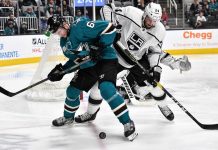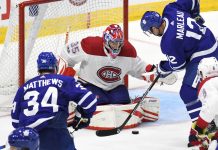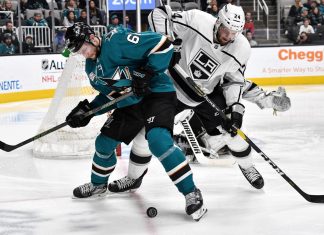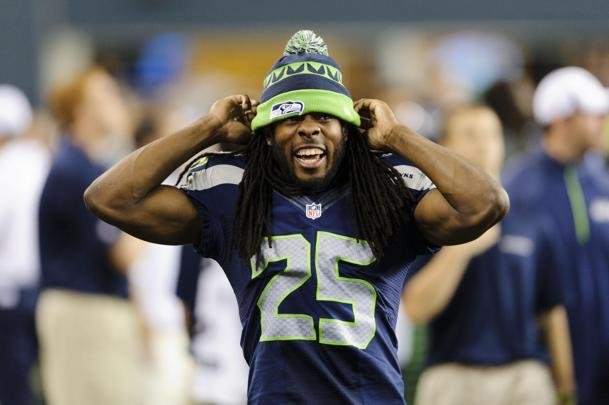Jonathan Toews says he just wants his contract to be worth what it says on paper.
Right now, it’s not that simple.
Under terms of the collective bargaining agreement, NHL owners and players divide hockey-related revenue 50/50, and if player salaries exceed that split a certain percentage is withheld in escrow to make it even. The Chicago Blackhawks captain and fellow players have lost upward of 10% of their pay to escrow over the past seven seasons, which is why 25 of 31 NHL Players’ Association representatives surveyed by The Associated Press and Canadian Press named escrow as the biggest bargaining issue with September deadlines looming to terminate the current CBA effective the fall of 2020.
”A. escrow and B. escrow,” Toews said when asked the two biggest issues in labor talks.
Olympic participation, the definition of hockey-related revenue, post-career health care, concerns about youth squeezing out older players because of the salary cap and money were the other topics player reps pointed to as important to them.
Escrow, though, is a point of contention in locker rooms around the league. It is expected to be a significant topic in talks ahead of the owners’ Sept. 1 and players’ Sept. 15 deadline to opt out of this CBA and set the clock ticking toward another potential work stoppage.
”I think we, as players, are really educating ourselves on the economics of the game and how it works and why escrow is the way it is,” New Jersey Devils player rep Cory Schneider said. ”There are a lot of things that go into it, and we understand from the owners’ side how it works. But for us that’s definitely something that, it fluctuates quarter to quarter, year to year, so you never really know what it’s going to be and it’s hard to really understand what you’re earning or what your worth is when you’re getting a big chunk of it taken back.
”I don’t know if we’re going to eliminate it. Obviously we’ll figure that part out. But at least some way to mitigate it or control it better for us just to know what to expect.”
The CBA sets aside some part of a player’s salary in a bank account throughout the year. After the season, total revenue is calculated and if the league is not at its 50% share, it gets the escrow money to make up the difference.
NHLPA executive director Don Fehr said escrow has been discussed in talks with Deputy Commissioner Bill Daly and expects more to come. But there’s no quick fix to reduce or eliminate escrow without changing substantial things about the economics of the league.
”Obviously it’s an irritant to players and from time to time it can be a big one,” Fehr said. ”But the question is how you do it. I mean, you can fix escrow by cutting salaries. I don’t think players are interested in doing that. So it has to become something that you address in a manner which makes sense for the players and addresses their concerns.”
A handful of players voiced their concern that revenues aren’t growing enough to compensate for the natural growth of salaries – and the cap – over time. Because seven of 31 teams are based in Canada, the fluctuation of the Canadian dollar affects everything, and players would like to find a solution to the entire financial picture, including a look at what counts as hockey-related revenue.
”There’s definitely a concern and always an emphasis on the revenues and us growing the game,” Toronto Maple Leafs player rep John Tavares said. ”That’s a top priority because I think when we see growth, we’re obviously going to see it on the business side. When you feel the hit of escrow on top of whatever taxes we have to pay, it’s definitely something that guys notice and something you don’t enjoy seeing. It’s important to us, but in saying that the bigger picture is the growth of the game. When that happens, when we do those things right, that’ll lead to more revenues that will hopefully lead to some adjustments.”
Commissioner Gary Bettman calls escrow ”a function of the cap” and said it’s going to be higher when that upper limit on salaries is higher.
”There are things you can do, either immediately or over time (where) you can manage the cap differently, which would manage the escrow, and those are things that obviously we need to be talking about,” Bettman said.
It’s not the only thing. Many players have expressed their desire to guarantee Olympic participation, though it seems impossible to collectively bargain because the International Ice Hockey Federation and International Olympic Committee are also involved. Countless business and political factors will go into whether the NHL sends its players to the Beijing Games in 2022.
One issue mentioned by players that can be bargained is how players are taken care of after they retire. Vancouver Canucks player rep Bo Horvat said medical coverage, treatment for concussion issues and other things matter.
He’s not alone in prioritizing that with talks ongoing and some optimism of maintaining labor peace because the issues are at least more straightforward than the last round of talks in 2012-13.
”Post-career stuff, health care stuff, lots of little things like that that are important to players as far as livelihood going forward,” Minnesota Wild player rep Devan Dubnyk said. ”The good news is there’s not anything major, but certainly some things we’re going to want to be talked about.”
—
Follow AP Hockey Writer Stephen Whyno on Twitter at https://twitter.com/SWhyno
—
More AP NHL: https://apnews.com/NHL and https://twitter.com/AP-Sports
25% Bonus via Western Union























